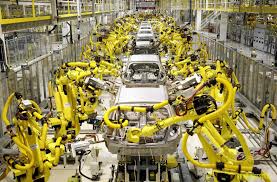
The wage inequality gap in the United Kingdom could get even wider due to machines that threat jobs that are able to generate up to £290 billion in wages
According to the estimate of the institute, during the next two years alone, about 44 per cent of the jobs in the U.K. might get replaced by machines displacing human workers.
The institute however cautioned that one should not however conclude instantly that automation might not turn out to be something that is bad for the society as well as the economy because is automation is regulated in a proper way then it might result in over all good and not become the "the paradox of plenty," where the overall economy is left better-off but while a number of communities result in losing out because of technological change.
The greatest danger of being replaced are the ones that are low paid, according to the IPPR which also anticipates there is potential chances that machines could replace jobs that would account to about fully a third of annual pay in the UK. There is need for the government to regulate the adoption of robotics which could ensure equal distribution of the benefits, the IPPR noted and said that the government had it in their power to come to the aid of those who are risk of being left out because of automation.
There were five key proposals by the think-tank for the proper role of the government so that the entire gamut and all of the issues related to automation can be addressed. It suggested that the jobs that are at threat of being replaced by machines need to be transformed and not eliminated.
The second proposal was aimed to prevent the widening inequality gap and for that the institution suggested to control the accumulation of wealth at the hands of those who own the new technologies and all other related business.
The third proposal was aimed to take complete advantage of productivity benefits and make sure wages rise by managing the speed of adoption and its occurrence.
The Fourth was aimed to create efficiency in management of employment inequality and ethics in the digital age through good strategies formulated by the government.
And lastly, IPPR concluded after its study that there should be focus of the owners to concentrate on enlarging the percentage of the people population who would potentially be benefitted due to automation and not simply on concentrating of amassing more wealth.
Mathew Lawrence, a senior researcher at the IPPR, said: “Managed badly, the benefits of automation could be narrowly concentrated, benefiting those who own capital and highly skilled workers. Inequality would spiral.”
Carys Roberts also from IPPR, said: “Some people will get a pay rise while others are trapped in low-pay, low-productivity sectors. To avoid inequality rising, the government should look at ways to spread capital ownership, and make sure everyone benefits from increased automation.
(Source;www.digitallook.com)
According to the estimate of the institute, during the next two years alone, about 44 per cent of the jobs in the U.K. might get replaced by machines displacing human workers.
The institute however cautioned that one should not however conclude instantly that automation might not turn out to be something that is bad for the society as well as the economy because is automation is regulated in a proper way then it might result in over all good and not become the "the paradox of plenty," where the overall economy is left better-off but while a number of communities result in losing out because of technological change.
The greatest danger of being replaced are the ones that are low paid, according to the IPPR which also anticipates there is potential chances that machines could replace jobs that would account to about fully a third of annual pay in the UK. There is need for the government to regulate the adoption of robotics which could ensure equal distribution of the benefits, the IPPR noted and said that the government had it in their power to come to the aid of those who are risk of being left out because of automation.
There were five key proposals by the think-tank for the proper role of the government so that the entire gamut and all of the issues related to automation can be addressed. It suggested that the jobs that are at threat of being replaced by machines need to be transformed and not eliminated.
The second proposal was aimed to prevent the widening inequality gap and for that the institution suggested to control the accumulation of wealth at the hands of those who own the new technologies and all other related business.
The third proposal was aimed to take complete advantage of productivity benefits and make sure wages rise by managing the speed of adoption and its occurrence.
The Fourth was aimed to create efficiency in management of employment inequality and ethics in the digital age through good strategies formulated by the government.
And lastly, IPPR concluded after its study that there should be focus of the owners to concentrate on enlarging the percentage of the people population who would potentially be benefitted due to automation and not simply on concentrating of amassing more wealth.
Mathew Lawrence, a senior researcher at the IPPR, said: “Managed badly, the benefits of automation could be narrowly concentrated, benefiting those who own capital and highly skilled workers. Inequality would spiral.”
Carys Roberts also from IPPR, said: “Some people will get a pay rise while others are trapped in low-pay, low-productivity sectors. To avoid inequality rising, the government should look at ways to spread capital ownership, and make sure everyone benefits from increased automation.
(Source;www.digitallook.com)














